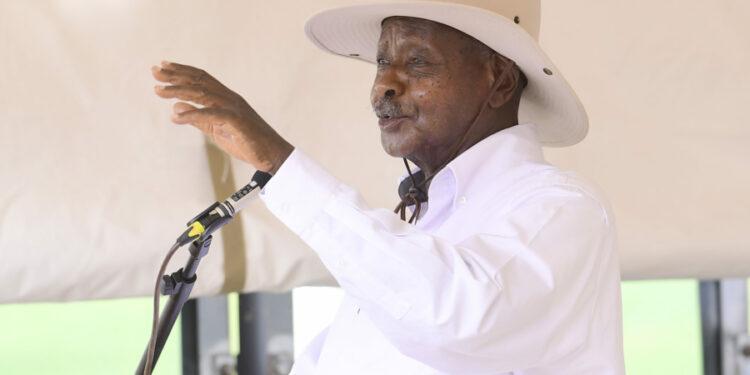Fraidah N Kulumba
Africa-Press – Uganda. On Wednesday night the President of Uganda Yoweri Kaguta Museveni through his Twitter account informed Ugandans that an official from the World Bank rang him to inform him about the statement from that Bank regarding the suspension of any new requests from Uganda for loans.
President Museveni accused the World Bank of using money to try to “coerce” the government over its controversial anti-gay legislation.
Museveni’s message followed an announcement by the World Bank on Tuesday that it was suspending new loans to the East African country over what is considered among the world’s harshest laws targeting LGBTQ communities.
The US-based global lender said that the law, which imposes the death penalty for certain same-sex acts, contradicts its values and that it would pause new funding until it could test measures to prevent discrimination in projects it finances.
The World Bank said that Uganda’s Anti-Homosexuality Act “fundamentally contradicts” the institution’s values and that no new public financing would be presented to its board of directors for approval for the time being.
The World Bank has an existing portfolio of USD 5.2 billion in Uganda, although these projects will not be affected.
At the end of May 2023, President Museveni signed into law the world’s harshest anti-LGBTQ+ bill, which allows the death penalty for homosexual acts.
The new law doubles down on already harsh sanctions imposed on LGBTQ+ people in Uganda, where consensual same-sex sexual intimacy is illegal. The legislation imposes the death penalty for so-called aggravated cases, which include having gay sex with someone below the age of 18 or where someone is infected with a life-long illness including HIV.
After President Museveni gave assent to the Anti-Homosexuality Act, the World Bank postponed a USD 90 million (£54m) loan that was meant to enhance the country’s health services.
The United States also reacted by imposing sanctions on the Speaker of the Parliament of Uganda Hon Anita Among travel to the U.S. by revoking her visa. The U.S. vowed to ban all Ugandans involved in human rights abuses against gay people from entering their country.
Several European nations – including Denmark, Norway, the Netherlands, and Sweden – have cut aid to Uganda to show their opposition to the law.
Assurance
Uganda is refusing to be bullied by a liberal-biased Western institution. In President Museveni’s message while responding to the World Bank loan ban he assured that the country he is leading will develop with or without loans.
He added that if Uganda needed to borrow, it could do so from other sources and that oil production expected to start by 2025 would provide additional revenues.
Mr. Museveni said that it’s unfortunate that the World Bank and other actors dare to coerce the Ugandans into abandoning their faith, culture, principles, and sovereignty, using money.
Uganda resisted pressure from the United States and the donor community, including threats to withdraw funding, especially in the health sector.
In June this year, President Museveni said that the West’s backlash against Uganda over anti-homosexuality law is unjustified and based on distortion and misrepresentation of facts.
He further explained that contrary to popular claims by Western leaders and pro-gay activists, the new law decriminalizes an individual for simply being gay or lesbian but forbids recruitment (s) by homosexual (s) of non-gay persons into homosexuality, exhibitions, and promotions of sexual orientation and performing homosexual sex on another person.
Loan ban effects
There is no doubt Uganda will be affected if the World Bank goes ahead with its plan of stopping giving loans to the country. The Ministry of Finance has issued a warning that emoluments and different salary obligations from the government will most likely be affected if the loan ban is put into practice.
Projects worth USD 1.8 billion approximately 6.7trillion shillings are likely to be affected. According to Dr. Fred Muhumuza, an economic expert, who has worked closely with the world bank and the government of Uganda, the bank has 2,711 active projects running in Uganda, with 798 projects in the pipeline all burgeoning in billions of dollars.
The government of Uganda continues to insist that it will not be pressed by the West to change the laws, which can see gay people jailed for life. According to Uganda’s authorities, President Museveni wanted “to demonstrate Uganda’s independence in the face of Western pressure and provocation.”
However, President Museveni said Uganda was continuing discussions with the World Bank “so that they and we avoid this diversion if possible.”
Hon. Chris Baryomunsi Uganda’s Minister of Information, Communications Technology, and National Guidance also confirmed that consultations were ongoing with the World Bank.
He reminded the World Bank and others that Uganda is a sovereign country, which takes decisions in the interests of her people, and this is the spirit of the Anti-Homosexuality Act.”
For More News And Analysis About Uganda Follow Africa-Press






